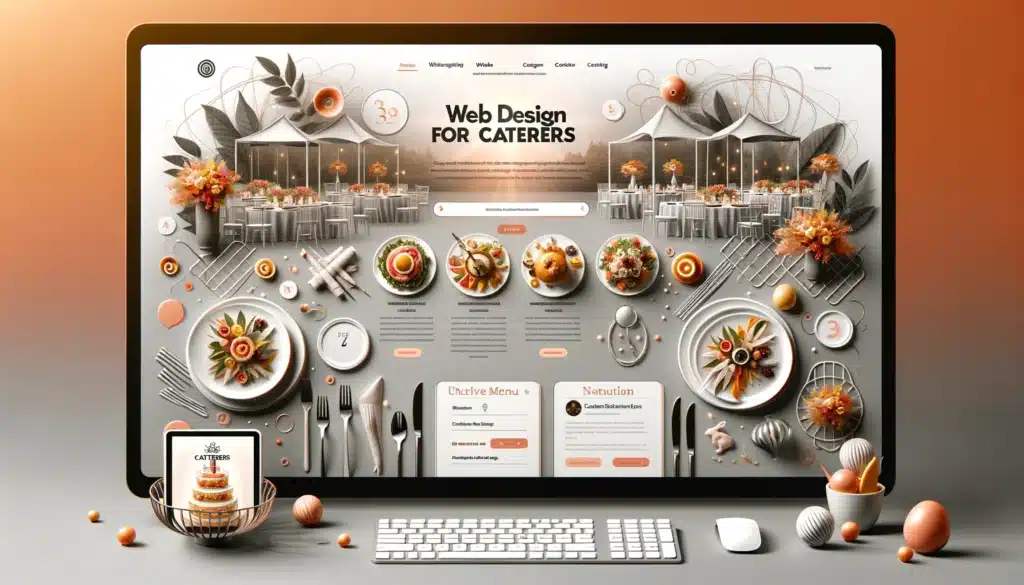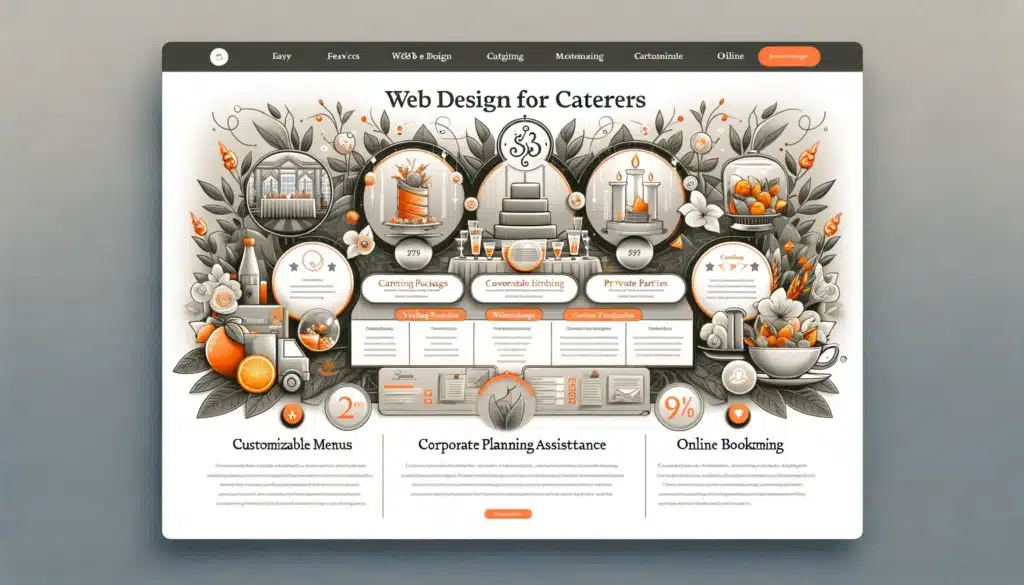
Are you a catering business looking to establish a strong online presence? In today’s digital age, having a website is essential for reaching a wider audience and showcasing your services.
We will discuss the importance of web design for caterers, provide examples of top catering company websites, and outline key steps to building a great catering website.
Highlighting the essential elements of a top-notch catering website and the importance of professional web design, we also offer FAQs and tips on improving your catering website with Nicada Digital’s expert services.
Key Takeaways:
Having a professional website is crucial for catering businesses to showcase their services and attract clients.
Choosing the right website platform, template, and implementing post-launch tasks are key steps in building an effective catering website.
Investing in professional web design for catering companies is essential to create a top-notch and visually appealing website that stands out from competitors.
What’s included as standard?
Free SSL Certificate for website security (12 months).
Free domain registration (12 months).
Website created with user experience design (UX) in mind
Fast, free hosting (12 months).
Free website related business email (for example in**@yo********.com).
Mobile responsive design for all devices.
30 days support with ongoing monthly website maintenance option if required.
Enquire Today
Simply fill out the form or call us on
0161 486 6048

Introduction to Web Design for Caterers
Web design plays a crucial role in the online success of catering businesses.
The visual aesthetics, functionality, and user experience of a catering website can significantly impact its performance. A well-designed website can create a positive first impression, conveying professionalism and quality to potential clients.
Branding elements such as colour schemes, logos, and typography are essential in establishing a cohesive and memorable identity. A thoughtfully crafted layout ensures easy navigation, guiding visitors to key information effectively. Incorporating SEO best practices helps in boosting online visibility and attracting more organic traffic. Mobile responsiveness is vital in catering to the growing number of users accessing websites from smartphones and tablets.
Why Having a Website is Essential for Catering Businesses
Having a website is essential for catering businesses to showcase their offerings, provide information to customers, and establish a strong online presence.
A well-designed website not only helps in displaying menus and services but also creates a sense of professionalism that attracts potential clients. Clear navigation makes it easy for visitors to explore different sections, while high-quality photography adds authenticity to the dishes and services showcased. By incorporating a clean and modern design, catering companies can effectively communicate their brand’s identity and values, leading to improved customer engagement and trust.
Best Examples of Catering Company Websites
Exploring the best examples of catering company websites offers valuable insights into effective branding, design consistency, engaging visuals, compelling content, and impactful customer testimonials.
One example of a catering website that excels in branding is ABC Catering. Their consistent use of vibrant colours representing freshness and professionalism creates a memorable brand image. Additionally, Catering123 stands out for its visually appealing design that seamlessly integrates food photography to entice visitors. Effective website marketing strategies can be observed on Delicious Delights, which strategically places customer testimonials on their homepage to build credibility and trust with potential clients.
Analysis of Top Catering Websites
Analysing the top catering websites reveals key aspects such as effective branding, intuitive layout, seamless functionality, responsive design, and optimisation for search engine rankings.
Regarding branding strategies, successful catering websites often incorporate brand stories that resonate with their target audience, creating a memorable impression. The layout plays a crucial role in guiding users smoothly through the website, ensuring they find the information they need effortlessly. Functional features like online ordering systems or customisable menus enhance user experience, making it convenient for potential clients to explore options. Responsive design elements are essential for catering sites to adapt seamlessly across various devices, offering a consistent experience.

Key Steps to Building a Great Catering Website
Building a great catering website involves key steps such as selecting a domain name, choosing the right website platform, picking a suitable website template, creating engaging content, incorporating high-quality images, and implementing post-launch tasks and strategies.
When considering the domain name for your catering website, remember to keep it simple, memorable, and relevant to the services you offer. It should ideally reflect your brand identity and be easy to spell and type.
Next, the choice of website platform is crucial. Platforms like WordPress, Wix, or Squarespace offer user-friendly interfaces and customizable options, catering perfectly to the needs of your business.
In terms of website templates, selecting one that aligns with your brand aesthetic and is optimised for mobile responsiveness is vital for a seamless user experience.
When crafting content for your website, ensure it is concise, informative, and showcases your unique selling points effectively to attract potential clients.
The quality of images on your catering website matters greatly. Investing in professional photography or high-resolution stock images can significantly enhance the visual appeal of your site.
After launching your website, focus on maintaining fresh content, optimising for search engines, and utilising social media to drive traffic and engagement.
Purchasing a Domain Name
One of the initial steps in building a catering website is purchasing a domain name that reflects the brand identity, showcases the catering services offered, and aligns with accessibility standards.
Choosing the right domain name plays a crucial role in establishing a strong online presence for a catering business. A memorable domain name not only helps in creating brand recognition but also conveys the type of services the company offers. For instance, a domain like SavoryDelightsCatering.com clearly indicates the nature of the business while being easy to remember. Selecting a domain extension that complements the main name, such as .catering or .events, can further enhance the website’s credibility. Ensuring that the chosen domain name is simple and accessible is essential for users to easily find and remember the website.
Choosing a Website Platform
Selecting the right website platform, whether it’s WordPress or Wix, is crucial for maintaining design consistency, ensuring mobile optimisation, and providing a user-friendly interface for catering website visitors.
When deciding between WordPress and Wix, one needs to consider the intricacies of each platform. WordPress offers a vast array of customisable themes and plugins, allowing for unparalleled design flexibility; however, this might require some technical know-how. On the other hand, Wix provides a more user-friendly drag-and-drop interface, ideal for beginners, although it may limit design options.
Mobile-friendly optimisation is another crucial factor to consider; here, Wix typically excels with its responsive templates, ensuring a seamless user experience on all devices. Conversely, WordPress plugins can sometimes lead to performance issues if not optimised correctly.
User interface plays a significant role in how visitors interact with your site. Wix simplifies the process with its intuitive editor, while WordPress offers more customisation options, which can be overwhelming for some users. In essence, selecting the right platform depends on the specific needs and expertise of the website creator.
Selecting a Website Template
When choosing a website template for a catering site, focus on elements like layout, colour palette, modern typography, white space utilisation, and a minimalist design approach to create a visually appealing and user-friendly experience.
Considering the design layout options, one could opt for a clean and organised grid structure to showcase dishes or an elegant full-screen image slideshow for a more sophisticated look.
Colour palette considerations play a vital role in evoking the right emotions; warm tones like gold and maroon often resonate well with culinary themes.
Utilising ample white space is pivotal in preventing visual clutter and directing focus, ensuring a seamless browsing experience. Embracing a minimalist design style fosters simplicity and elegance, encouraging visitors to focus on your offerings. An effective example of such a template is ‘Foodie Pro,’ which balances a clean layout with vibrant imagery, ideal for showcasing culinary delights.
Creating Compelling Content & Adding High-Quality Images
Compelling content and high-quality images are essential components of a successful catering website, enhancing visual appeal, conveying professionalism, and engaging visitors effectively.
When visitors land on a catering website, they are first drawn to the images that greet them. These images set the tone for the entire site, creating a powerful first impression. By investing in professional photography, catering businesses can showcase their offerings in the best light, highlighting the exquisite details of their dishes and presentations. High-quality images not only improve the visual appeal but also play a crucial role in establishing the brand’s credibility and professionalism. The choice of typography further enhances the site’s aesthetic, ensuring that the content is easy to read and navigate.
Implementing Post-Launch Tasks and Strategies
After launching the catering website, focus on post-launch tasks such as website marketing initiatives, blog creation, showcasing awards, refining web content, and ensuring web accessibility compliance for sustained success.
One of the key post-launch activities for catering websites involves website marketing initiatives. This includes search engine optimisation, social media promotion, email campaigns, and pay-per-click advertising to attract more customers. Implementing a blog on the website can help engage visitors and climb up the SERPs. Recognising and showcasing any awards received can boost credibility and trust with potential clients. It’s crucial to continuously refine and update the web content to stay relevant and provide value to visitors. Ensuring web accessibility compliance is essential for reaching a wider audience and adhering to legal requirements.
Essential Elements of a Top-Notch Catering Website
A top-notch catering website incorporates crucial elements such as captivating visuals, seamless design, optimal functionality, enhanced user experience, strategic calls to action, intuitive navigation bars, impactful branding colours, and attention-grabbing hero images.
Visuals play a vital role in creating an enticing first impression for visitors, encouraging them to explore further. The design coherence ties the various elements together, ensuring a cohesive and professional look throughout the site. Functional aspects, like fast loading times and easy-to-use interfaces, contribute to a seamless user experience. Effective call-to-action strategies help guide visitors towards conversions, while clear navigation elements make finding information effortless. Consistent branding colours reinforce brand identity, and impactful hero imagery can immediately capture attention and communicate the website’s essence.
Importance of Professional Web Design for Caterers
Professional web design is paramount for caterers as it reflects the quality of catering services, enhances web presence, maintains design consistency, caters to the target audience, and supports effective marketing strategies.
Professional web design plays a crucial role in creating a visually appealing and user-friendly platform for caterers to showcase their offerings. By investing in a well-designed website, caterers can convey a sense of professionalism and expertise to potential clients, instilling trust and confidence in the services provided. A thoughtfully crafted website can significantly improve online visibility, making it easier for customers to find and engage with the catering business. Consistency in design elements such as colours, fonts, and layouts helps in reinforcing brand identity and creating a memorable user experience.
FAQs about Web Development for Catering Companies
Navigating through common questions about web development for catering companies sheds light on crucial aspects such as website design, SEO practices, optimisation techniques, and search engine visibility.
Regarding website design for catering companies, it’s essential to create a visually appealing and user-friendly platform that showcases your unique offerings and services. Responsive design is key to ensure compatibility with various devices ensuring a seamless browsing experience.
- SEO strategies play a pivotal role in attracting organic traffic to your catering website. Tailoring your content with relevant keywords and metadata can significantly boost your search engine rankings.
- Optimisation techniques, such as image compression and caching, can enhance the speed and performance of your website, improving user experience and reducing bounce rates.
Can I Design a Catering Website Myself or Should I Hire a Professional?
Deciding whether to design a catering website independently or engage a professional web designer depends on factors like design complexity, customisation needs, user-friendliness, optimisation requirements, and the desired level of professionalism.
When opting to create a catering website independently, you have the creative freedom to design according to your vision, but this can be limited by your technical skills. Professional web designers, on the other hand, bring years of expertise and industry knowledge to the table. Their experience allows them to craft visually appealing websites that resonate with your target audience, incorporating the latest design trends and ensuring seamless functionality.
In terms of customisation options, working with a professional designer opens the door to a wide array of tailored features and unique design elements. This level of customisation is often challenging to achieve alone, especially if you lack coding skills or design experience.
How Often Should I Update My Catering Website?
Determining the frequency of updating a catering website involves evaluating factors like content relevance, design freshness, functional enhancements, user experience improvements, and SEO optimization requirements.
For content relevance, it’s crucial to assess if your menu, prices, and services are up to date to meet customers’ expectations and industry trends.
Regularly updating the design is vital too, ensuring a modern and user-friendly interface. Functional enhancements may vary, but adding features like online ordering or event booking can enhance the site’s capabilities. Improving user experience involves testing site performance and navigation regularly. Implementing SEO maintenance with keyword updates and metadata adjustments helps maintain visibility on search engines.
Is SEO Really Essential for a Catering Website?
The need for SEO for a catering website lies in its ability to enhance online visibility, climb up the SERPs, target relevant keywords, drive conversions, and ultimately boost business success.
Effective SEO strategies can help a catering business stand out amidst the fierce online competition, ensuring that potential clients find the website when searching for catering services. By optimising website content with relevant keywords tailored to the catering industry, businesses can attract the right audience and increase organic traffic. A strong SEO foundation not only increases visibility but also establishes credibility and trust with customers, leading to higher conversion rates and sustained growth over time.
Conclusion
Creating a successful catering website requires meticulous optimisation, design consistency, user-friendly features, and engaging content to attract and retain customers effectively.
Optimisation plays a critical role in ensuring that your catering website ranks high in search engine results, increasing visibility and attracting more potential clients. Consistent design across all pages enhances brand credibility and professionalism, leaving a lasting impression on visitors. Incorporating user-friendly elements such as easy navigation and clear call-to-action buttons simplifies the user experience, encouraging them to explore and interact with your services.
Engaging content such as mouth-watering images, informative blog posts, and customer testimonials can capture the attention of visitors and build trust in your catering services. By focusing on these elements, a professionally designed catering website can significantly boost your online presence and help you stand out in a competitive market.
Next Steps for Improving Your Catering Website
Moving forwards, enhancing your catering website involves refining design elements, optimising functionality, boosting SEO performance, prioritising mobile optimisation, and enriching user experience for sustained growth and success.
One crucial step in improving your catering website is to focus on design enhancement. This includes creating a visually appealing layout that reflects your brand identity and showcases your offerings effectively. Implementing clear navigation and intuitive menus can enhance user experience and make it easier for visitors to find the information they need. Optimising images and videos for fast loading speeds can reduce bounce rates and keep users engaged.
Frequently Asked Questions
What is Web Design for Caterers?
Web Design for Caterers refers to the process of creating and designing a website specifically for catering businesses. It involves creating a visually appealing and user-friendly website that showcases the services and menu of a catering company.
Why do caterers need a website?
Having a website is crucial for any catering business in today’s digital age. It allows caterers to have an online presence, reach a wider audience, and showcase their services and menu. A website also helps in building credibility and trust with potential clients.
How can Nicada Digital help with Web Design for Caterers?
Nicada Digital is a professional web design agency that specialises in creating websites for caterers. Our team has years of experience in designing websites for the catering industry, and we understand the unique needs and requirements of caterers. We can create a customised and impactful website that will help your catering business stand out.
What elements should be included in a catering website?
A catering website should include elements such as a visually appealing design, high-quality images of food and events, a menu page, contact information, and testimonials from satisfied clients. It should also be mobile-friendly and have easy navigation for a seamless user experience.
Can I update my website myself?
Yes, Nicada Digital can create a user-friendly content management system (CMS) for your catering website, allowing you to make updates and changes easily. We will provide training and support to ensure you have full control over your website.
How can a website benefit my catering business?
A website can greatly benefit your catering business by increasing your online presence and visibility, attracting more clients, and ultimately boosting your sales and revenue. It also allows for easy communication with potential clients and helps in building a strong brand for your catering business. With Nicada Digital’s expertise in web design, we can help take your catering business to the next level.

Please Get In Touch …
Please get in touch and we’ll be very happy to discuss your project requirements and will offer expert, friendly advice.
Phone:
Email:
Website Form:
Times:
Mon – Fri 9am – 5pm
